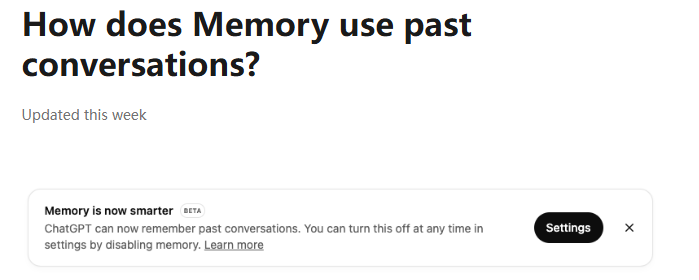OpenAI's latest update adds a powerful memory function to its AI assistant ChatGPT, allowing it to recall the user's previous communication content across conversations, significantly improving the degree of personalization of the user experience. This feature does not simply record the conversation, but gives users complete control over the memory information. Users can freely delete, archive or clear specific information to ensure conversation privacy and data security. This update builds on OpenAI’s first memory feature launched in February, which achieves a major leap from single-conversation memory to cross-conversation memory, marking a key step in the direction of AI assistants becoming true personal assistants.
OpenAI has announced the launch of a new memory feature that allows its AI assistant ChatGPT to recall past communications when users open new conversations. This update aims to improve the user experience and enable ChatGPT to respond to user needs more personalizedly.

The new memory function adds conversation memory capabilities to ChatGPT. Users can fully control their stored information through the settings panel, including deleting specific memories, clearing past conversation records, or archiving certain chat records to keep them private.
Users have complete control over ChatGPT's memory functionality. They can delete specific memories through settings, or delete past conversations from their conversation history. Additionally, users can choose to archive certain conversations to prevent ChatGPT from remembering them. It should be noted that if the user turns off the memory function, this will not clear existing memories, and deleting past conversations will not affect the memories formed by the Assistant from those conversations.
For users who wish to hold conversations without memory, ChatGPT provides the option to turn off memory or use the ad-hoc chat feature to keep conversations private. This series of features is designed to enhance the user experience and make every interaction with ChatGPT smoother and more personalized.
Prior to this update, OpenAI launched its first memory feature in February 2024, which was designed to help ChatGPT understand user preferences, such as writing style or favorite programming language. Users simply tell ChatGPT the information they want it to remember in the chat. The new cross-conversation memory function expands on this foundation, allowing AI to extract and utilize historical information in different conversations to improve the relevance and personalization of conversations.
Compared to the OpenAI update, Google has also stepped up its pace in terms of memory capabilities. Google added a similar memory feature to its chatbot Gemini in November 2023. This feature, currently only available to paid users of Google One AI Premium, allows users to tell the AI their preferences, such as their favorite type of food, to provide more accurate recommendations in subsequent conversations. Users can also turn off this feature at any time, and Google emphasizes that it will not use stored personal information to train its AI models.
The introduction of these memory features reflects a broader goal of the AI industry to transform chatbots into true personal assistants. Both OpenAI and Google hope that through these systems, AI can continuously learn and remember the user's preferences during the conversation, thereby automatically adjusting its response and saving the user the trouble of repeatedly providing basic information in each conversation.
Highlights:
OpenAI launches a new memory function, ChatGPT, which can recall users’ past communications across conversations.
Users can manage memory settings and delete or archive specific information at any time.
Google has also launched similar features aimed at improving the personalized services of its AI assistant.
All in all, ChatGPT's new memory function represents an important milestone in the development of AI assistants. The competition between OpenAI and Google is also driving the continuous progress of the AI industry, bringing users a smarter and more personalized experience. In the future, we look forward to seeing more similar functions emerge to allow AI to better serve humans.